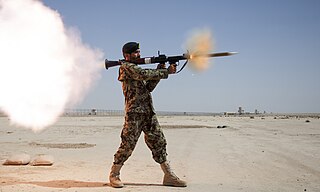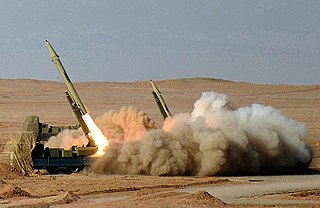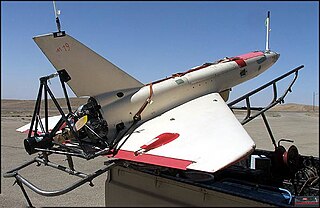
The AGM-114 Hellfire is an American missile developed for anti-armor use, later developed for precision drone strikes against other target types, especially high-value targets. It was originally developed under the name "Heliborne laser, fire-and-forget missile", which led to the colloquial name "Hellfire" ultimately becoming the missile's formal name. It has a multi-mission, multi-target precision-strike ability and can be launched from multiple air, sea, and ground platforms, including the MQ-1 Predator and MQ-9 Reaper. The Hellfire missile is the primary 100-pound (45 kg) class air-to-ground precision weapon for the armed forces of the United States and many other countries. It has also been fielded on surface platforms in the surface-to-surface and surface-to-air roles.

The 9M133 Kornet is a Russian man-portable anti-tank guided missile (ATGM) intended for use against main battle tanks. It was first introduced into service with the Russian army in 1998.

Shoulder-fired missile, shoulder-launched missile or man-portable missile, among other variants, are common slang terms to describe high-caliber shoulder-mounted weapons systems; that is, weapons firing large, heavy projectiles ("missiles"), typically using the backblast principle, which are small enough to be carried by a single person and fired while held on one's shoulder. The word "missile" in this context is used in its original broad sense of a heavy projectile, and encompasses all shells and rockets, guided or unguided. A more formal variant is simply shoulder-fired weapons system and the like.

The M47 Dragon, known as the FGM-77 during development, is an American shoulder-fired, man-portable anti-tank guided missile system. It was phased out of U.S. military service in 2001, in favor of the newer FGM-148 Javelin system.

The RPG-29 "Vampir" is a Soviet reusable rocket-propelled grenade (RPG) launcher. Adopted by the Soviet Army in 1989, it was the last RPG to be adopted by the Soviet military before the fall of the Soviet Union in 1991.

The 9M14 Malyutka is a manual command to line of sight (MCLOS) wire-guided anti-tank guided missile (ATGM) system developed in the Soviet Union. It was the first man-portable anti-tank guided missile of the Soviet Union and is probably the most widely produced ATGM of all time—with Soviet production peaking at 25,000 missiles a year during the 1960s and 1970s. In addition, copies of the missile have been manufactured under various names by at least six countries.

The Fateh-110, also known as NP-110, is an Iranian solid-fueled surface-to-surface ballistic missile produced by Iran's Aerospace Industries Organization since 2002. It is single-stage, road-mobile and can carry a high-explosive warhead of up to 500 kg. Four different versions, the Fateh-110A, 110B, 110D-1 and Fateh-E Mobin were developed with varying accuracy. The latest version, first shown to the public in August 2018 reportedly has a range of 300 km is reportedly more accurate than previous versions.

The Misagh-1 is an Iranian man-portable surface-to-air missile. It was developed by the Shahid Kazemi Industrial Complex in Tehran.

Hezbollah, a Lebanese Shia Islamist political party and militant group, has an exceptionally strong military wing, thought to be stronger than the Lebanese Army and equivalent to the armed strength of a medium-sized army. A hybrid force, the group maintains "robust conventional and unconventional military capabilities", and is generally considered to be the most powerful non-state actor in the world.

The HESA Ababil is an Iranian family of single-engine multirole tactical unmanned aerial vehicles manufactured by Iran Aircraft Manufacturing Industrial Company (HESA). The Ababil comes in four main lines, the Ababil-2 ,3, 4 and 5, of which the Ababil-2 has a number of variants. It is considered a long-range, cost effective, low-technology drone.

The Toophan is an Iranian SACLOS anti-tank guided missile reverse-engineered from the American BGM-71 TOW missile. The Toophan 1, an unlicensed copy of the BGM-71A TOW missile, began mass production in 1988 and the Toophan 2, a BGM-71C ITOW variant, was publicly shown in 2000.

The Qods Mohajer is an Iranian single-engine tactical unmanned aerial vehicle (UAV) built by the Qods Aviation Industry Company in four main variants from the 1980s to the present day. The Mohajer family is primarily used for reconnaissance, and is among the most mature and well-known Iranian UAVs.

The Qods Saeghe is a simple Iranian recoverable target drone.

The Shahed Saegheh, also called the Shahed 191, is an Iranian turbofan/piston-powered flying wing unmanned combat aerial vehicle (UCAV) produced by Shahed Aviation Industries. It is based on, but smaller than and substantially different from, a Lockheed Martin RQ-170 Sentinel UAV that was captured by Iran in 2011 and then reverse-engineered. It is one of two Iranian flying wing UAVs based on the RQ-170, along with the Shahed 171 Simorgh, a larger version.

The 9M133M Kornet-M Russian anti-tank guided missile (ATGM) is an improved version of the 9M133 Kornet ATGM, with increased range and an improved warhead.

The Shahed 171 Simorgh is an Iranian jet-powered flying wing unmanned combat aerial vehicle (UCAV) produced by Shahed Aviation Industries.

The Sadid-1 is an Iranian TV-guided anti-tank missile derived from Iran's Toophan missiles.

The LMUR is a Russian helicopter-launched air-to-surface missile. It is also recognized under the alternative designations Izdeliye 305 and 9A-7755.


















